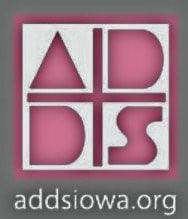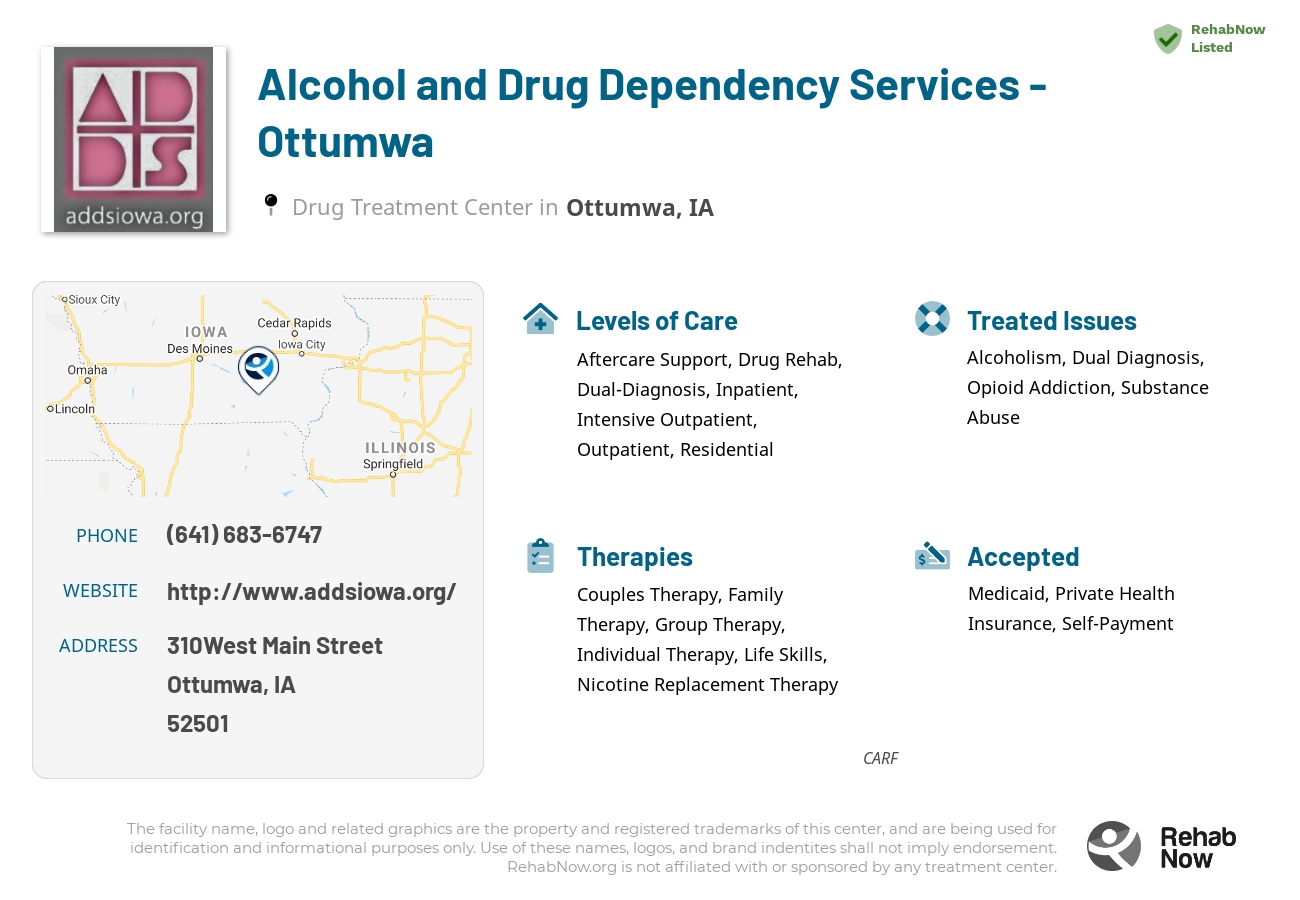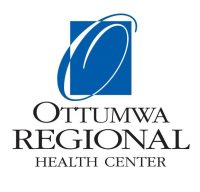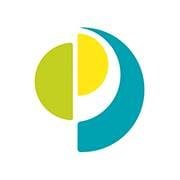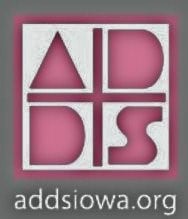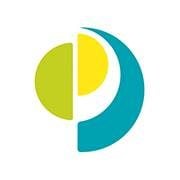Alcohol and Drug Dependency Services - Ottumwa
Drug Rehab Center in Ottumwa, Iowa
Alcohol and Drug Dependency Services (ADDS) in Ottumwa, Iowa offers comprehensive treatment and support for addiction and substance abuse, including assessments, outpatient services, intensive outpatient programs, and aftercare planning, with evidence-based treatments and additional resources provided by a highly trained staff.
About Alcohol and Drug Dependency Services - Ottumwa in Iowa
Alcohol and Drug Dependency Services - Ottumwa (ADDS) is located in Ottumwa, Iowa and provides comprehensive treatment and support for individuals living with addiction and substance abuse. They offer a full continuum of care, including assessments, outpatient services, intensive outpatient programs, and aftercare planning. The facility is operated by experienced and highly trained staff, who provide supportive services to help clients achieve lasting sobriety and experience a life of improved health, well-being and purpose.
ADDS offers evidence-based treatments, such as cognitive behavioral therapy, individual counseling, and group therapy. Clients can also take part in educational classes, such as life skills and relapse prevention seminars. ADDS also provides additional resources, such as access to mental health professionals, drug and alcohol testing, referral services, and support groups.
ADDS is accredited by the Commission on Accreditation of Rehabilitation Facilities (CARF) and licensed by the Iowa Department of Human Services. They are also proudly recognized by the National Committee for Quality Assurance (NCQA) for providing high-quality healthcare services. Additionally, ADDS is dedicated to providing a safe, comfortable and welcoming environment to foster healing and recovery for all individuals seeking treatment from addiction and substance abuse.
Genders
Ages
Modality
Additional
Accreditations

CARF
The Commission on Accreditation of Rehabilitation Facilities (CARF) is a non-profit organization that specifically accredits rehab organizations. Founded in 1966, CARF's, mission is to help service providers like rehab facilities maintain high standards of care.
Conditions and Issues Treated
Many people need to recover from substance abuse to live a healthy life. In the end, if you can get through all the steps: detoxifying your body, rehabilitation after some time or when needed (depending on the type), and recovery while also receiving therapy support throughout the process, it can be worth it.
A detoxification center is a common place to start the recovery process from substance abuse. With your body and mind restored, you can continue to heal without the lingering effects of drugs.
Many people who struggle with opioid addiction need to attend specific programs like methadone , Suboxone or Vivitrol clinics.
These types of programs will provide the patient with legal, prescription medications that can help them overcome their cravings for illegal opioids like heroin or fentanyl . If the patient has a chronic condition like Hepatitis C, they must undergo treatment before they can begin taking these medications.
Dual Diagnosis is a specific relationship between two or more disorders that have the same symptoms and can sometimes be treated together. This is used in the treatment planning process when dealing with drug addicts. Dual diagnosis can be viewed as a chronic medical condition that has comorbid psychiatric disorders.
Although addiction and a mental illness may have separate symptoms that are not easy to detect, they often go hand in hand. Many times, drug abuse is a direct result of the mental illness. In other words, treating the addiction will not resolve all of your issues. Unless you also treat the underlying mental illness, you will not be successful in achieving sobriety.
Levels of Care Offered
This center offers a variety of custom treatment tailored to individual recovery. Currently available are Aftercare Support, Drug Rehab, Dual-Diagnosis, Inpatient, Intensive Outpatient, Outpatient, Residential, with additional therapies available as listed below.
Inpatient treatment is an intensive program that takes place when a patient checks into a rehabilitation facility. The treatment includes detoxification and counseling sessions, which are round the clock. Outpatient treatments are also available, but inpatient care is advised as the first step of rehabilitation.
Intensive rehab ensures the patient stays in a substance-free atmosphere, improving treatment success rates. The patient participates in group therapy for motivation from other patients who have overcome addiction. Family members are also involved in providing emotional support throughout the program.
An intensive outpatient program is usually the first phase of addiction treatment. It provides relief for those who are addicted, but are not ready to commit to an inpatient setting. Typically, the patient lives at home and is able to work or go to school. IOPs consist of a daily 3 to 5-hour program, and there is a required number of hours per week. Most patients go to IOP between 20 and 40 hours per week. The patient attends group counseling and individual therapy throughout the duration of treatment. They also meet daily with their therapist to discuss how it’s going and where they are in the recovery process.
The goal here is to teach patients healthy coping skills, such as stress management and identifying thoughts and behaviors that lead to relapse. The implementation of these skills will be useful as the individual transitions into the next phases of treatment.
An outpatient treatment program is set up to help with alcohol or drug addiction, or a co-occurring disorder. The patient must attend the Iowa facility for their therapy and other programs but are able to return home each night. The frequency of mandatory attendance decreases after much of Alcohol and Drug Dependency Services - Ottumwa‘s program is complete.
Residential treatment programs are those that offer housing and meals in addition to substance abuse treatment. Rehab facilities that offer residential treatment allow patients to focus solely on recovery, in an environment totally separate from their lives. Some rehab centers specialize in short-term residential treatment (a few days to a week or two), while others solely provide treatment on a long-term basis (several weeks to months). Some offer both, and tailor treatment to the patient’s individual requirements.
Aftercare is a term that’s used to refer to any sort of continuing care offered for a drug addict who has voluntarily entered a rehabilitation program. This type of care can be provided in several settings, including outpatient therapy sessions after the addict has completed an inpatient program. There are also 12-step support groups, such as Alcoholics Anonymous, which can provide additional help for addicts trying to stay sober.
Therapies & Programs
Individual Therapy is a critical component of addiction recovery. Therapists work with patients to identify the root of their addiction and figure out how to better handle the issues that led to them using drugs. Individual Therapy is the one-on-one session where people meet with their therapist. Individual therapy provides a safe space for people to open up and discuss personal and sensitive topics which they may not feel comfortable discussing in a group setting.
Couples therapy at Alcohol and Drug Dependency Services - Ottumwa focuses on addiction treatment for the addict and their spouse. The addict’s family, not just the addict, can benefit from this form of therapy. Couples therapy addresses communication problems, trust issues, lack of intimacy, and abuse in intimate relationships. Couples therapy can help rebuild trust between partners, which increases the chances for successful treatment and sustained recovery.
Intimate relationships can be damaged during addiction, and professional help may be necessary to rebuild the often destroyed trust and love. Couples therapy at Alcohol and Drug Dependency Services - Ottumwa helps couples improve communication and rebuild trust. Either or both partners will be helped by this treatment administered by professionals. This treatment can also help one or both partners if addiction is the problem.
Family therapy will also help families realize that the addiction is not their fault. For many years, people blamed themselves for an addict’s behavior and felt that they had done something wrong. This is not the case. Addiction is a disease, and it can strike anyone, even if their life seems fine from the outside. It can bring a lot of shame to a family when they have an addict in their midst, but if everyone is open and honest with each other, then they can help everyone stay in recovery.
Group Therapy is utilized by drug treatment centers like Alcohol and Drug Dependency Services - Ottumwa to provide the recovering drug addict with a platform to talk about their feelings and experiences. It also provides for an opportunity to learn from other addicts who have successfully overcome their addiction.
Group Therapy is employed in lectures, seminars, or discussion groups (the latter two are typically conducted as “therapy groups”). It is recommended that all group members be recovering addicts for this type of therapy to work (though it does not exclude others with lived experience).
Cognitive behavioral therapy is also a popular service for individuals living with addiction. This type of supportive treatment uses both one-on-one counseling and group sessions to teach addicts how to identify thoughts, behaviors and emotions that might increase their risk of relapse.
These professionals can help addicts develop coping skills for managing stress, improving self-esteem and overcoming triggers. They might also use behavioral therapy to help addicts learn how to avoid cravings and warning signs that could lead them back into addiction.
Therapy can be used as a step-down from inpatient treatment or as the primary method of overcoming an addiction. No matter which option is best for the addict, they will teach important emotional coping techniques, which can make it easier for addicts to get through the tough days.
Training in improved life skills helps those recovering from addiction feel more capable of self-care. Alcohol and Drug Dependency Services - Ottumwa are daily skills that give the person the tools they need to survive.
The therapy covers practical activities like cooking, job hunting, social interaction, and money management, helping to fill in the knowledge gaps caused by addiction.
These life skills help the person self-manage their recovery and stay on track. It also reduces relapse risk as they gain confidence in their day-to-day abilities.
Payment Options Accepted
For specific insurance or payment methods please contact us.
Is your insurance accepted?
Ask an expert, call (888) 674-0062
Alcohol and Drug Dependency Services of Southeast Iowa Associated Centers
Discover treatment facilities under the same provider.
- Alcohol and Drug Dependency Services - Wapello in Wapello, IA
- Alcohol and Drug Dependency Services of Southeast Iowa - Burlington in Burlington, IA
- Alcohol and Drug Dependency Services - Burlington in Burlington, IA
- Alcohol and Drug Dependency Services - Mount Pleasant in Mount Pleasant, IA
- Alcohol and Drug Dependency Services - Keokuk in Keokuk, IA
Learn More About Alcohol and Drug Dependency Services of Southeast Iowa Centers
Additional Details
Specifics, location, and helpful extra information.
Ottumwa, Iowa 52501 Phone Number(641) 683-6747 Meta DetailsUpdated November 25, 2023
Staff Verified
Alcohol and Drug Dependency Services - Ottumwa Patient Reviews
There are no reviews yet. Be the first one to write one.
Ottumwa, Iowa Addiction Information
Iowa ranks 2nd lowest in the nation for illicit drug use, but 12% of its residents are still using these drugs every single year. Methamphetamines account for more than 90% of all drug-related prison admissions in Iowa. Alcohol is the most widely abused substance in the state, with 23% of residents admitting to heavy drinking.
Marijuana is the most commonly abused drug among young adult abusers in Ottumwa, Iowa. There were over 100 admissions to treatment centers for Ottumwa's residents in recent years. There was a 22% increase in Ottumwa drug-related arrests from 2012 to 2019. There are many different drug treatment options available for someone looking to get sober in Ottumwa. Common treatments include inpatient and outpatient rehab, 12-step programs, and therapy.
Treatment in Nearby Cities
- Creston, IA (101.5 mi.)
- Orange City, IA (232.2 mi.)
- Bloomfield, IA (18.5 mi.)
- Cherokee, IA (201.0 mi.)
- Clarion, IA (136.5 mi.)
Centers near Alcohol and Drug Dependency Services - Ottumwa
The facility name, logo and brand are the property and registered trademarks of Alcohol and Drug Dependency Services - Ottumwa, and are being used for identification and informational purposes only. Use of these names, logos and brands shall not imply endorsement. RehabNow.org is not affiliated with or sponsored by Alcohol and Drug Dependency Services - Ottumwa.
